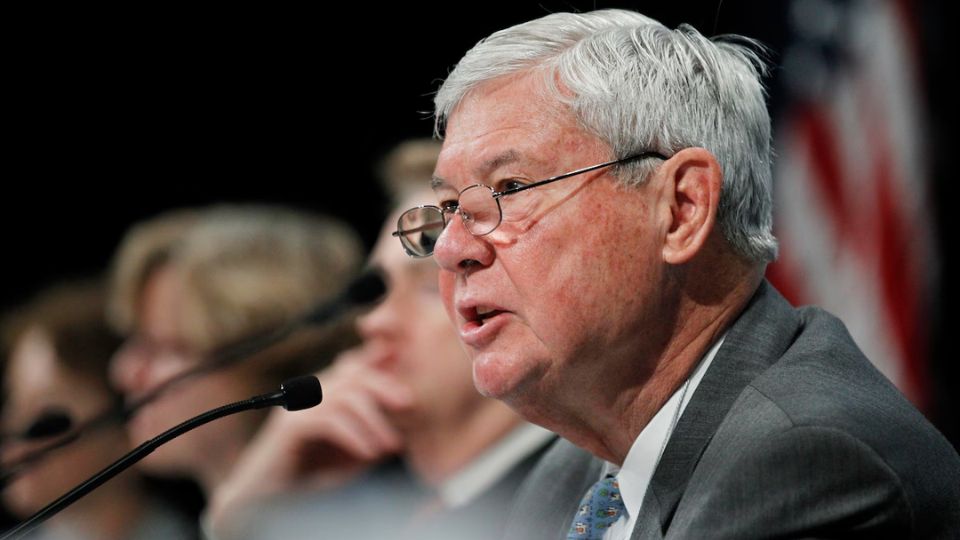Bob Graham, a moderate Democrat who served as the governor of Florida for two terms and as a U.S. senator for three terms, was highly regarded by the people of Florida. He was known for his ability to bring people together and was a strong critic of the Iraq War. He passed away on April 16 at the age of 87. Gwendolyn Graham, his daughter, announced the death on social media. There is no additional information currently.
Mr. Graham left his position in the Senate in 2005 after serving in public office for almost forty years. Except for a brief attempt to become the Democratic presidential nominee in 2004, he was always successful when running for elected office. He was one of the few Democrats elected governor of Florida in several decades. The state party, which used to have a strong hold on the state, lost its influence as Florida became a swing state leaning towards the right.
Mr. Graham, who had family members involved in publishing The Washington Post, became wealthy by developing real estate. He transformed his father’s dairy and cattle farm into a planned suburban community known as Miami Lakes. He earned millions of dollars by investing in real estate while also pursuing a career in politics. In 1966, he was elected to the Florida House and served in the state Senate for most of the 1970s.
His father, who was also a state legislator, had lost the Democratic primary for governor in 1944. This disappointment fueled Mr. Graham’s interest in politics. In 1978, Governor Reubin Askew (a Democrat) was not eligible for re-election. Mr. Graham won a competitive Democratic primary to replace him and then easily defeated his Republican opponent, Jack Eckerd, who was from the Eckerd drugstore empire, in the general election.
Also Read: Arrest Warrant Issued for State Rep. of Pennsylvania Kevin Boyle
Mr. Graham was not well-known throughout the state when he entered the 1978 race. Some people saw him as a wealthy liberal from South Florida. However, his campaign received a boost from a strategy called the “workday” strategy, which was organized by a well-known political consultant named Robert Squier.
He was previously known as “D. Robert Graham,” but now he goes by “Bob.” He was recorded doing different jobs like serving tables, building with bricks, paving roads, cleaning manure, packing citrus fruit, and teaching students in urban areas all across the state’s 67 counties.
What started as a campaign stunt became a regular part of Mr. Graham’s time as governor. He made it clear from the beginning that his “workdays” were not meant for photo opportunities. He didn’t wear an apron or work boots for just one hour and then leave. He stayed after the camera crews left and worked a full day, getting to know the people he represents and making a lasting impression on Floridians with different political beliefs.
“I learned not only about how people make money, but also about how they live their lives,” he later told the Orlando Sentinel.
He led important environmental projects in Tallahassee, the capital of the state. One of his notable achievements was the Save Our Everglades campaign in 1983. This campaign played a crucial role in protecting the state’s famous natural resource from being developed and suffering ecological damage.
During Mr. Graham’s first term, Florida had a lot of people coming from Cuba and Haiti who needed help. It took a long time to get money from the government to support and resettle them. At the same time, the state was dealing with increasing crime, such as a lot of drug smuggling. In 1980, there were riots in the Liberty City section of Miami. This happened after a jury, made up of only White people, found police officers not guilty of beating a Black insurance agent to death during a traffic stop.
During his 1982 reelection campaign, Mr. Graham’s opponents accused him of being lenient on crime. In response, he emphasized his support for the death penalty. In 1976, the U.S. Supreme Court allowed capital punishment to resume, and in May 1979, Mr. Graham executed John Spenkelink, who had been convicted of murder, using the electric chair. The execution in Florida was the first one in over ten years. As governor, he had the support of many people and signed 16 death warrants.
Mr. Graham easily won his reelection campaign in 1986 and secured a U.S. Senate seat by defeating Paula Hawkins, a conservative Republican incumbent who had served only one term. In Washington, he was not widely recognized for specific laws he passed, but rather for his skill in collaborating with members from both political parties on bills related to environmental and education programs, healthcare for older adults and the sick, and initiatives to combat drug-related crimes.



Leave a Reply